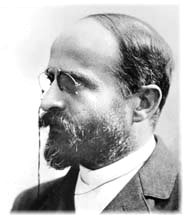Theodor Lipps facts for kids
Quick facts for kids
Theodor Lipps
|
|
|---|---|

Theodor Lipps (unknown year)
|
|
| Born | 28 July 1851 Wallhalben
|
| Died | 17 October 1914 (aged 63) |
| Era | 19th-century philosophy |
| Region | Western philosophy |
| School | Munich phenomenology |
|
Main interests
|
Aesthetics |
|
Notable ideas
|
Lipps–Meyer law |
|
Influences
|
|
|
Influenced
|
|
Theodor Lipps (German: [lɪps]; born July 28, 1851 – died October 17, 1914) was a German philosopher. He is famous for his ideas about aesthetics, which is the study of beauty and art. Lipps developed the idea of Einfühlung, also known as empathy. He described it as "projecting yourself onto something you are looking at." His work helped create new studies that combine psychology (the study of the mind) and philosophy (the study of knowledge and existence).
Contents
About Theodor Lipps
Theodor Lipps was a very important professor in Germany. Many students from different countries came to learn from him. He was very interested in art and what makes things beautiful. Much of his philosophy focused on these ideas.
One of his big fans was Sigmund Freud, a famous psychologist. Lipps's ideas influenced Freud's work in two main ways. First, Lipps believed in "unconscious mental events." This means thoughts and feelings we have without knowing it. He was a strong supporter of the idea of the unconscious mind. Second, Freud was also influenced by Lipps's writings on humor.
Understanding Empathy (Einfühlung)
Lipps took the idea of Einfühlung from another thinker named Robert Vischer. Einfühlung literally means "feeling-into." It is often translated as empathy or aesthetic sympathy.
Lipps made this term popular by changing Vischer's original idea. He made it sound more like a scientific psychology concept. He wrote about it in his work, Aesthetics of Space and Geometrical Illusions. The term was used to explain how we look at art and see our own feelings in it.
Lipps turned Einfühlung into a theory about aesthetics. Other thinkers like Roger Fry and Vernon Lee later made it even better. This idea of connecting with art is found in many other philosophies about beauty.
According to Lipps, empathy starts when you see an object and feel pleasure from it at the same time. It's not like the object gives you pleasure separately. He believed that empathy involves movement or activity. This activity is linked to the object you are observing. It comes from the object and cannot be separated from it. Because of his work, Lipps is seen as a key figure in the psychology of aesthetics. Other important thinkers in this field include Stephan Witasek and Johannes Volkelt.
The Philosophy of Psychologism
Early in his career, Lipps was a strong supporter of psychologism. This philosophy was based on Neo-Kantianism, which was popular in German philosophy in the late 1800s. Lipps became a leading voice for this way of thinking.
In his book, Logik (1893), he stated his belief in "unlimited foundational logical psychologism." This means he thought that the psychology of thinking and the logic of thinking were partly the same. He saw logic as the "physics of thinking," not the "ethics of thinking." Lipps said that "logic is a psychological subject." This is because thinking happens in the mind, and thinking is a mental event.
Later in his life, Lipps started to use some ideas from Edmund Husserl. Husserl's ideas led Lipps in a new direction. Some of Lipps's students did not like his psychologism. They joined with some of Husserl's students to create a new type of philosophy. This new branch was called phenomenology of essences.
One of these students was Moritz Geiger. He wrote an early paper on the meaning of empathy. Lipps's ideas were very important in Geiger's work. Another student was Paul Ferdinand Linke. He studied with Lipps at the Ludwig-Maximilians-Universitat. Linke also explored Husserl's phenomenology in his first book, Die phaenomenale Sphaere.
Lipps also tried to connect "what ought to be" with "what is" in his ideas about aesthetics.
See also
 In Spanish: Theodor Lipps para niños
In Spanish: Theodor Lipps para niños
- Otto Selz

